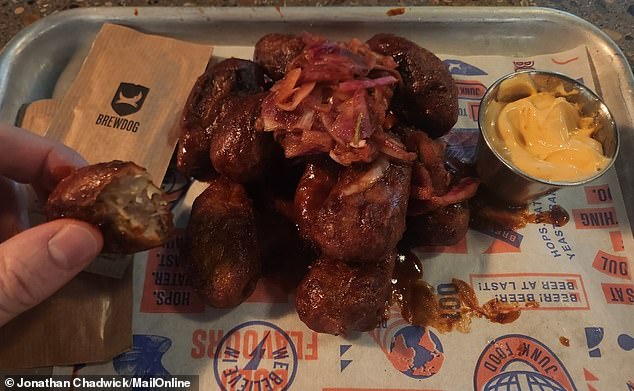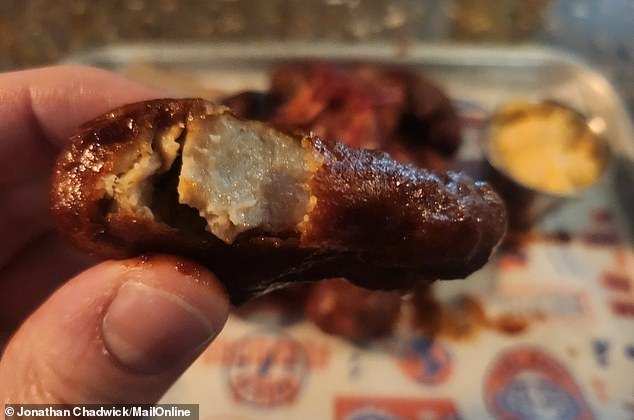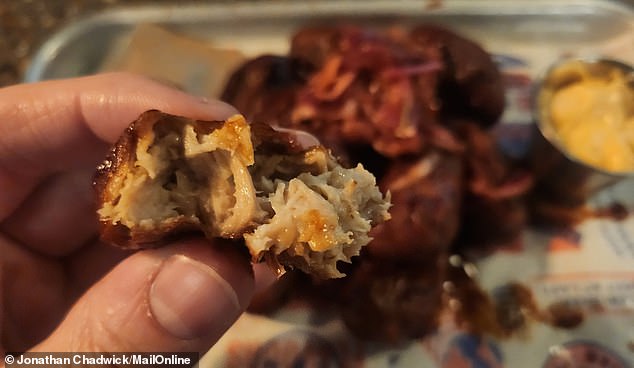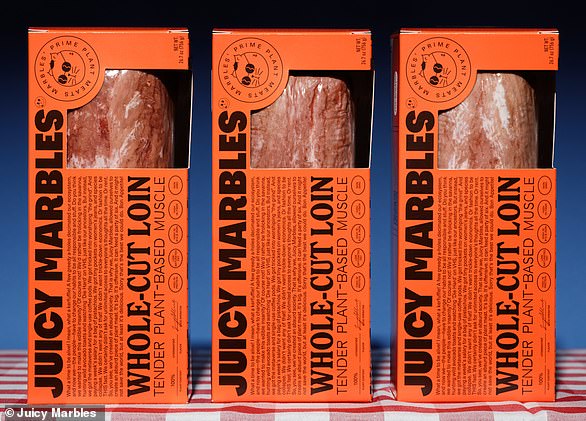I tested Europe’s first ‘skin-on’ VEGAN wings – and they taste even better than the real deal
Vegan imitations of popular meats are increasingly hitting the market, and Britain just got a completely new product: skin-on plant-based wings.
The wings are made by London firm ‘This’ and are served in BrewDog bars in ‘Veganuary’.
The fake meat is made from soy and pea protein with the addition of olive oil, making it as moist and juicy as real chicken.
Meanwhile, the exterior is made from seaweed to mimic the mouth-watering crispiness of the bird’s deep-fried skin.
But what do they actually taste like? MailOnline finds out.
Made by London firm ‘This’, the wings will be served in BrewDog bars in ‘Veganuary’

From the outside, they look like real fried chicken: deep brown and glistening with liquid
‘This’ is already responsible for countless plant-based meat substitutes such as sausages, pork belly and ground beef that you may have seen in the supermarkets.
It says these skin-on wings are the first to be released in Europe.
Unlike most plant-based ‘chicken’ on the market that mimic white meat, this is the first product to mimic dark cuts of meat such as wings and thighs, according to the company.
In general, dark meat has a different texture and deeper flavor than white meat and falls apart more easily in the mouth.
But replicating chicken wing meat has taken This two years of work, as well as three mysterious patent-pending technologies.
‘Chicken wings and feet have a complex three-dimensional architecture in which protein fibers are linked by a network of connective tissue and intramuscular fat,’ says Luke Byrne, R&D director at This.
‘This structure provides juiciness and an incredible texture when eating, which we have now been able to recreate.
‘Our wings form soy and pea proteins into bundles of muscle fibres, spreading an olive oil-based fat between them.

Unlike most plant-based ‘chicken’ on the market, which mimic white meat, this is the first product to mimic dark cuts of meat such as wings and thighs

The fake meat is made from soy and pea protein with the addition of olive oil to make them moist and succulent
‘We then cover them with hyper-realistic chicken skin to mimic the unique structure, texture and nutritional profile of chicken.’
BrewDog is selling each wing for 25p this month, meaning I can get a decent dinner-sized portion of 12 for just £3.
This is undoubtedly a bargain, although most of BrewDog’s revenue comes from its chic boutique beers, many of which cost more than £7 a pint.
The wings are smothered in sauce (I opt for Korean BBQ), which makes my hands a sticky mess, but that’s the way it is with any decent wing experience.
From the outside, they look like real fried chicken: deep brown and glistening with fat.
Although they contain no bones, This has carefully crafted the wings so that they form the perfect limb shape.
When you bite into it, the outside is wonderfully salty and crunchy, while the ‘meat’ is creamy and moist and somehow separated into strands of fiber, just like the real meat.
Unlike every other vegan product I’ve tried, I don’t taste any hint of the replacement protein used – in this case pea and soy.
Granted, what makes them so delicious is the sauce, but can’t the same be said about real chicken wings?

The fake meat is creamy and moist and appears to have somehow separated into strands of fiber, just like the real meat
To be honest, I like this one even more than the real thing.
Despite being a meat eater, real wings usually disappoint me: the skin is rubbery and there isn’t enough meat to enjoy on the bones.
Towards the end I’m confronted with a plate of a mutilated carcass – a depressing reminder of a past life – and I can’t help but think, ‘Was this all really worth it?’
With the plant-based wings, I can put an entire wing in my mouth and eat it in one go without having to worry about bones or ethical considerations.
Additionally, according to This, they are ‘low in saturated fat, high in protein and a source of fibre’, although I fear the salt content may be quite high, as with other vegan imitation foods.
While I’m not concerned about Veganuary, I’ll be heading back to BrewDog for another round of 25 cent wings before the end of the month.
But I may have to save my money until February if I want to afford a round of BrewDog beers.

